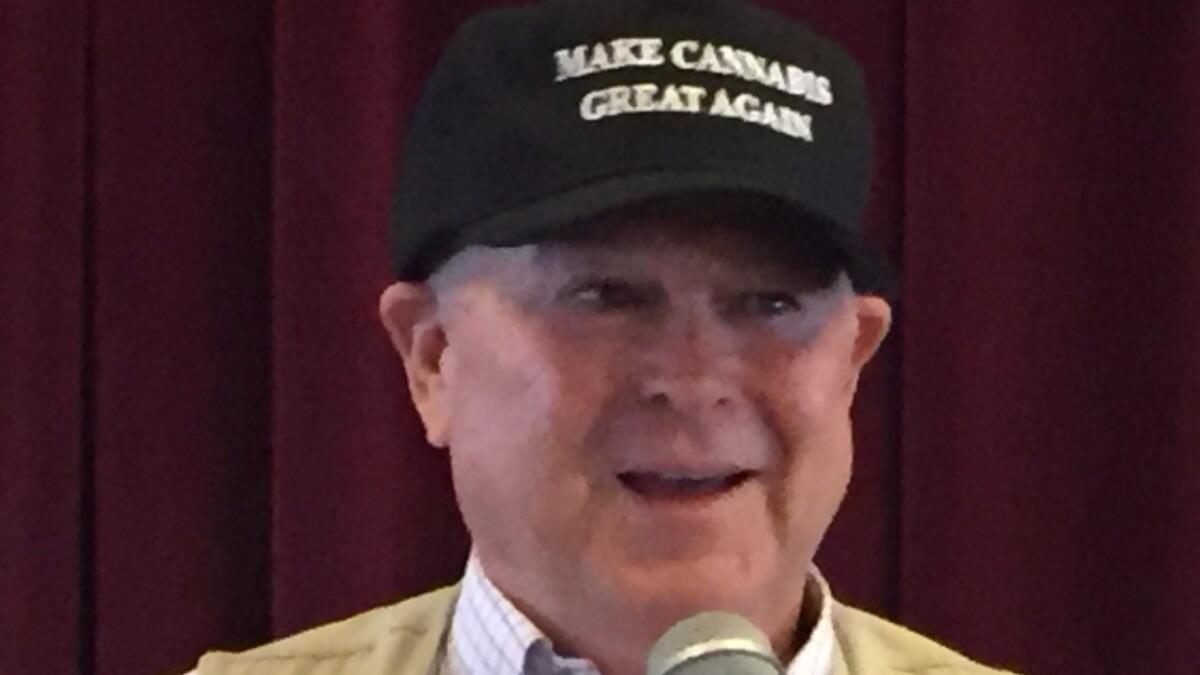A Republican lawmakerâs hat at a marijuana conference says it all: âMake Cannabis Great Againâ

Proposition 64, a measure that would legalize marijuana for adult recreational use, has qualified for the California ballot.
I couldnât find a single person at the State of Marijuana Conference â16 on the Queen Mary this week willing to predict anything other than success for Proposition 64, the measure that could legalize cannabis in California for adult recreational use.
Polls continue to show that almost two-thirds of Californiaâs likely voters support passage, though things could tighten up closer to election day.
No question, a pungent wind is blowing across America.
Already, adult use of marijuana is legal in Washington, Oregon, Colorado and Alaska.
In November, voters in eight other states will be making choices about legalizing recreational and medical marijuana. Like California, Arizona, Maine, Massachusetts and Nevada could approve the use of recreational pot. Florida, Arkansas and North Dakota voters will consider legalizing medical marijuana (already the standard in 25 states, plus the District of Columbia). Montana voters will consider easing restrictions on the stateâs medical marijuana law.
In California, communities up and down the state are scrambling. City councils and boards of supervisors are passing ordinances, moratoriums and bans. Some are courting industry, getting ready to capitalize on what has been described as a coming âgreen rush.â Others are sticking their heads in the sand.
In the last few years, a virtual mini-industry of cannabis conferences has sprung up, featuring not just the latest on legislation and research but tons of discussion about investment, innovation, branding and, inevitably, the coming clash between the legacy cannabis world â âthe dreadlocked warriors, the rainbow revolutionaries, the radical faeries, the wise earth mothers,â in the words of Oakland dispensary owner Steve DeAngelo â and the forces of commercialization.
âWe are seeing the first signs of what is going to be a monumental collision,â said DeAngelo, founder of the stateâs largest dispensary, Harborside, and president of ArcView Group, a cannabis investor network. âItâs going to be wrenching, itâs going to be jarring, itâs going to be shocking.â
He urged his legacy cannabis colleagues to embrace the changes, to take advantage of the capital infusion and the expertise offered by techies and established entrepreneurs.
âTheir presence is powerfully dampening the stigma associated with cannabis,â he said. âAnd the financial success of the industry is encouraging and motivating ever-increasing numbers of businesses, individuals and organizations who were opposed to us a few years ago, or at their best, neutral. And now they are turning into our best friends. Why? Because America loves a winner, and we are winning now.â
We are seeing the first signs of what is going to be a monumental collision. It’s going to be wrenching, it’s going to be jarring, it’s going to be shocking.
— Cannabis advocate Steve DeAngelo, on the inevitable clash between legacy pot entrepreneurs and corporate interests
There is another collision coming as well, one to which he only briefly alluded during his speech Monday.
And that is the one between the states and the federal government â specifically the Drug Enforcement Administration â which rejected petitions this summer calling on the agency to change how marijuana is classified. Despite the fact that millions of Americans are prescribed cannabis for pain, for nausea, for post-traumatic stress issues, for epilepsy and so on, the plant remains a Schedule 1 drug, considered as dangerous as cocaine and heroin, devoid of medicinal value.
âAnd of course,â said DeAngelo, âBig Pharma is right there by their side.â
This point came up quite repeatedly during the two-day conference.
Suzanne Sisley, an Arizona physician, is one of the few cannabis researchers to receive marijuana from the federal government (which maintains one grow, in Mississippi). She noted that Insys Therapeutics Inc., which produces Dronabinol, a synthetic cannabinoid for cancer patients with nausea, has donated half a million dollars in the fight against marijuana legalization in Arizona.
The reason? Oh, greed. In an SEC filing, she noted, Insys stated that âlegalization of marijuana or non-synthetic cannabinoids in the United States could significantly limit the commercial success of our Dronabinol products ⌠and our ability to generate revenue, and our business prospects, would be materially adversely affected.â
Yes, because who would want to ingest an expensive, man-made chemical with unwanted side effects when you can use an inexpensive natural substance that human beings have safely ingested for millennia?
::
I was fascinated by the stories of local officials, who came to the Queen Mary to compare notes on how they are dealing with cannabis.
The City Council of Coalinga, the tiny Central Valley town 50 miles southwest of Fresno, caused an uproar among its citizens in January, when it approved medical marijuana cultivation and a dispensary. But when Ocean Grown Extracts, a medical cannabis oil manufacturer, offered to buy the local private prison, whose mothballing had cost Coalinga 100 jobs and a million dollars a year in revenue, voters reconsidered.
âThe game changer was when we told people we can provide opportunity to fill a void left by other businesses,â said Coalinga City Councilman Nathan Vosburg. âWhen you lose a million dollars, you can either cut or create revenue. If we can get a company to come in and make medicine, thatâs a step in the right direction. We sold the prison to them for $4.1 million. The city of Coalinga will be out of debt.â
Vosburgâs fellow panelist, Yolo County Supervisor Don Saylor, was impressed. âThey had a prison, captured by this mentality that prohibition has created, and now theyâve sold it for cannabis. Thatâs just incredible.â
Yolo County, mostly agricultural, has created regulations for cannabis cultivators. Saylor foresees collaborations between growers and the countyâs most important institution, UC Davis.
Saylor said he often hears from constituents who are conflicted about the cannabis boom. âThey say, âI donât like this at all and how do I get into the business?ââ
About two weeks ago, a licensed Yolo County cannabis grower, considered an exemplar for his adherence to permit requirements, including applying for Water Quality Control Board permits, was raided by a law enforcement task force from Sacramento, Placer and El Dorado counties, Saylor said. (Yolo County was not part of the task force, though a Yolo County judge signed the warrant. No charges have been filed.)
Only 53 of the countyâs estimated 800 to 1,000 cannabis growers have applied for permits. Itâs easy to see why some prefer to stay in the shadows.
::

Anni Marshall, the mayor of Avalon, came looking for answers to a unique problem. Thereâs no legal way to get pot to her island.
âAny advice so that every one of our patients is not breaking the law?â she asked Dana Rohrabacher, the Republican congressman who has pushed fellow conservatives to support legalization for years.
âI donât have a magic bullet on this,â he said. âWe are evolving out of the most stupid law in the history of our country. Iâm sorry. There is no easy answer.â
With that, he put on a black baseball cap. It said, âMake cannabis great again.â
Twitter: @AbcarianLAT
ALSO
When are marijuana users dangerous drivers? Gov. Brown approves study to find out
Capitol Journal: The problems with rushing to legalize marijuana for stoner use in California
Op-Ed: What your kids need to know about marijuana, legalized or not
More to Read
Get the L.A. Times Politics newsletter
Deeply reported insights into legislation, politics and policy from Sacramento, Washington and beyond. In your inbox three times per week.
You may occasionally receive promotional content from the Los Angeles Times.











